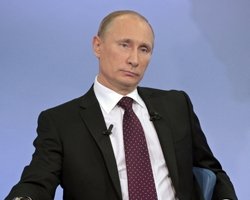Putin’s Already Paying Dearly for Ukraine – and the Price Will Only Go Up
Putin believes that Russian sovereignty can be best protected by its growing isolation. However, his fundamental misunderstanding of how the post-imperial, post-World War Two international system works has already created serious economic consequences in Russia, writes William E. Pomeranz.

Russian President Vladimir Putin has adopted a “go it alone” approach throughout the Ukraine crisis and regularly describes his country as “independent” and nonaligned. But Moscow is not as isolated as Putin makes out. The fact that he cannot see this reality — or chooses to ignore it — has produced a series of decisions that has seriously undermined Russia’s global role.
For the past two decades, Moscow has viewed its foray into global institutions as a major success. It has increasingly integrated into the global economy. Those achievements, however, now present Putin with a major dilemma.
In the aftermath of the Soviet Union’s collapse, Russia signed multiple treaties and joined numerous international organizations, including the Council of Europe, the G7 (which became the G8) and the World Trade Organization.
Whether Russia understood the underlying obligations that accompanied its memberships is unclear. The ink was not yet dry on Russia’s accession to the WTO, for example, when Putin demanded that member countries be allowed to introduce protectionist measures during times of global insecurity.
Yet the consensus in Russia was that membership bought Russia a vital seat at the table and increased its influence in world affairs. In addition, the United States and the European Union generally believed that it was better to have Russia inside — as opposed to outside — the international system of global governance even if Russia did not meet all the prerequisites for full membership.
The Ukrainian crisis has exposed the flaws of this thinking — especially for the West. For Putin, however, events in Ukraine have raised a larger question: Should Russia remain a part of the global system?
Russia’s ambivalent attitude toward global institutions reflects its history — a single autocratic leader has dominated the country’s public institutions for centuries. Indeed, since returning to power in 2012, Putin’s agenda has focused on reining in all other Russian political and civic institutions — the legislature, the judiciary, the media, higher education, nongovernmental organizations — and has faced little real opposition in the process. So it is not surprising that Putin entered the Ukrainian crisis with the firm belief that international institutions would not get in his way.
Putin’s fundamental misunderstanding of how the post-imperial, post-World War Two international system works has already created serious economic consequences in Russia. Under the recent European Union and U.S. economic sanctions, state-owned Russian banks and Russian companies now have limited access to the international banking system. Moscow is also barred from receiving new loans from the European Investment Bank and the European Bank for Reconstruction and Development, a loss of several billions of dollars annually.
Meanwhile, Gazprom, the state-controlled natural gas company, still awaits the verdict of the European Commission’s investigation of possible antimonopoly violations. Significant fines usually accompany such inquiries — as Google and Microsoft can attest. The Yukos expropriation bill, which covers Putin’s 2004 confiscation of Russia’s then largest privately held oil company, also finally came due in July. The Permanent Court of Arbitration at The Hague and the European Court of Human Rights ruled against the Russian state to the tune of $50 billion and $2.6 billion, respectively.
Meanwhile, Russia’s new sanctions on agricultural imports and its consistent abuse of inspections to block fruit, vegetable and meat imports from the European Union, United States, Moldova and Ukraine seem to be ideal fodder for a claim to the WTO Dispute Settlement Body. Poland has already announced its intention to file a WTO complaint, and other countries appear likely to follow.
Russia’s ultimate bill for its Ukrainian adventure should not only be measured in money lost but also in terms of opportunities missed. Russia’s suspension from the G8 occurred on the eve of its presidency — just as Putin planned to lead the fight against tax evasion and offshore banking. Problems he battles against in Moscow.
Russia would have found a receptive audience among its fellow G8 members, whose nations also suffer from significant capital flight. Now Russia has to address the problem alone at a time when Russian capital flight, for the first six months of 2014 ($75 billion) exceeded the entire amount of 2013.
Russia may not think that it is bound by any alliances. But it turns out that institutions do matter — and Russia cannot easily retreat from the global economy. Indeed, virtually every retaliatory move proposed by Putin has backfired on Russia and left it in a far weaker financial position.
Putin, for example, proposed crippling deposit restrictions on MasterCard and Visa before he had an alternative Russian payment system in place. He thereby threatened the ability of Russians to accept — and make — credit card payments. Rumors also have circulated that Russia intends to ban European air carriers from flying over Siberia on Asia routes. These reports immediately sent Aeroflot shares tumbling since it receives upward of $300 million from the fees paid by foreign airlines.
The toll for the recently announced food bans remains uncertain. But there will likely be serious costs as well because Russia will lose both high-end food products from Europe and low-end agricultural products from Ukraine and Moldova. Some Russian commentators insist that alternative suppliers exist and that all logistical obstacles can be easily overcome. They also claim that the sanctions will benefit Russia’s domestic food producers and farm-equipment manufacturers. Though for certain products — particularly beef, fish, fruit and vegetables — Russian retailers need to quickly find new foreign partners to fill the gap.
Putin’s decree implementing these sanctions conspicuously included a clause calling on the Russian government to take appropriate measures to prevent a sudden increase in food prices. So Putin clearly anticipates some economic costs to these sanctions.
By consistently dismissing the role of institutions — both domestic and international –Putin has backed himself into a corner. His remaining options are either compromise on eastern Ukraine — and suffer the domestic political consequences — or doubling down and intervening directly in Donetsk and Luhansk. The former will rely on international bodies to smooth the process, while the latter will be in open defiance to a large part of the world community.
Putin seems to be leaning toward the second option. Yet that also means that he believes that Russian sovereignty can best be protected by its growing isolation.
Soviet dictator Joseph Stalin tried a similar approach in the 1930s, for he also pursued a policy that isolated the Soviet Union from the world economy. Before the Ukraine crisis, Putin at least seemed to acknowledge the role of globalization. His recent actions suggest a lack of sophistication about global markets and the extent to which Russia has been integrated into the post-World War Two global architecture. The price tag for this miscalculation will be considerable.
Putin is more popular according to Russian public opinion polls than he has ever been during his 14 years in office. He has achieved this success, however, by undermining the very institutions, both domestic and international, that facilitated his consolidation of power. He is more powerful — yet more exposed — than at any time during his presidency.
About the Author

William E. Pomeranz
William Pomeranz, the Director of the Wilson Center’s Kennan Institute, is an expert guide to the complexities of political and economic developments in Russia, particularly through the lens of law. He leverages extensive, hands-on experience in international and Russian jurisprudence to address a wide range of legal issues, from the development of Russia’s Constitution to human rights law to foreign investment and sanctions. He is also the author of Law and the Russian State: Russia's Legal Evolution from Peter the Great to Vladimir Putin (Bloomsbury, 2018).
Read More
Kennan Institute
The Kennan Institute is the premier US center for advanced research on Russia and Eurasia and the oldest and largest regional program at the Woodrow Wilson International Center for Scholars. The Kennan Institute is committed to improving American understanding of Russia, Ukraine, Central Asia, the Caucasus, and the surrounding region though research and exchange. Read more










